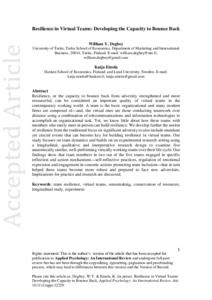Resilience in Virtual Teams: Developing the Capacity to Bounce Back
William Y. Degbey; Katja Einola
https://urn.fi/URN:NBN:fi-fe2021042822009
Tiivistelmä
Resilience, or the capacity to bounce back from adversity strengthened
and more resourceful, can be considered an important quality of virtual teams
in the contemporary working world. A team is the basic organizational unit many
modern firms are composed of—and, the virtual ones are those conducting
teamwork over distance using a combination of telecommunications and
information technologies to accomplish an organizational task. Yet, we know
little about how these teams with members who rarely meet in person can build
resilience. We develop further the
notion of resilience from the traditional focus on significant
adversity to also include mundane yet crucial events that can
become key for building resilience in virtual teams. Our study focuses on
team dynamics and builds on an experimental research setting using a longitudinal,
qualitative and interpretative research design to examine five anatomically
similar, well-performing virtually working teams over their life cycle. Our
findings show that team members in two out of the five teams engaged in
specific reflection and action mechanisms—self-reflective practices, regulation
of emotional expression and engagement in concrete actions promoting team
inclusion—that in turn helped these teams become more robust and prepared to
face new adversities. Implications for practice and research are discussed.
Kokoelmat
- Rinnakkaistallenteet [29335]
